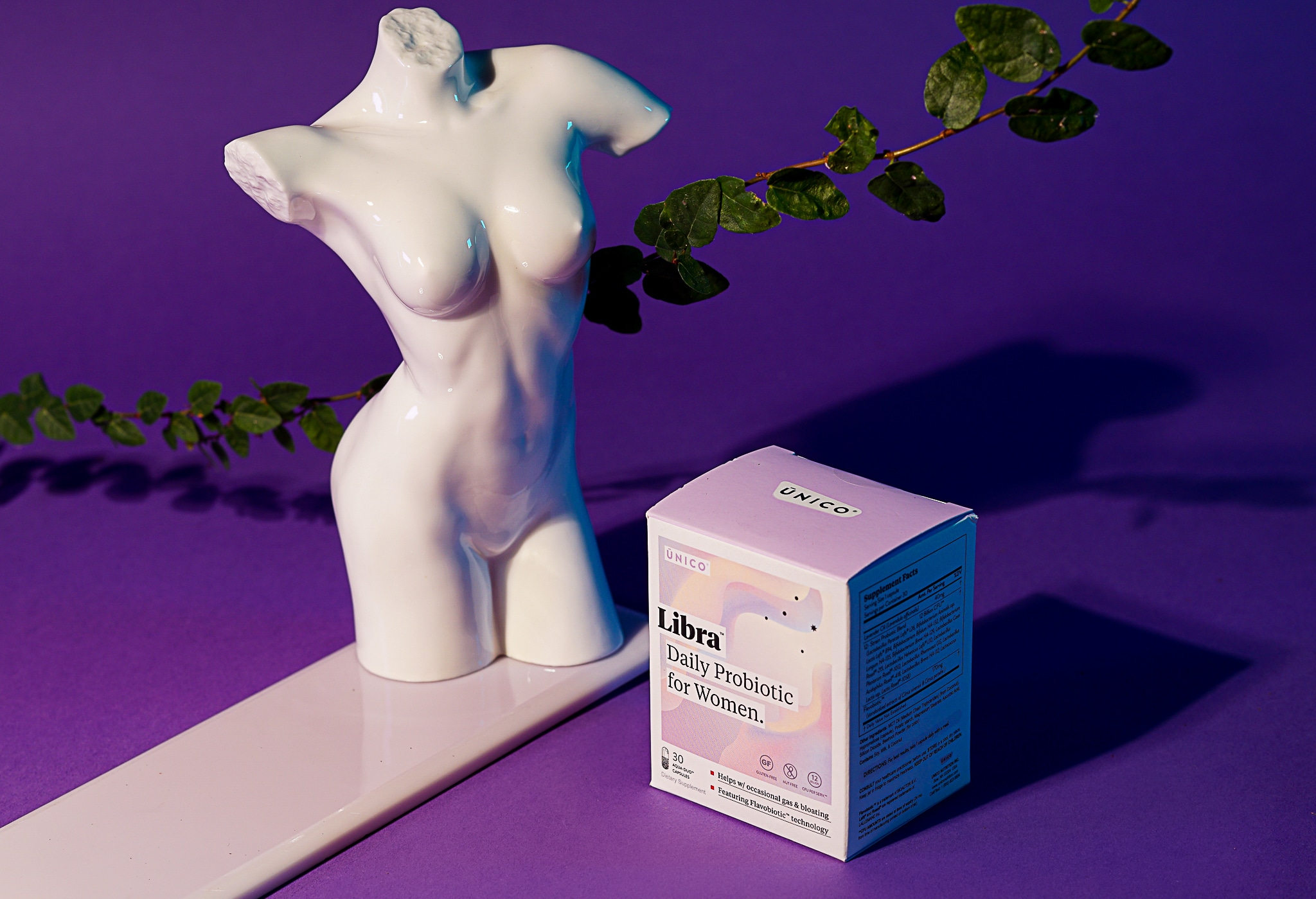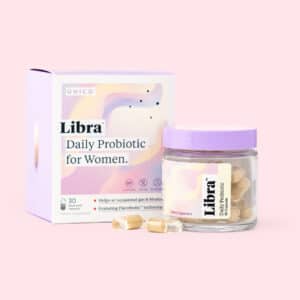Modern culture has us all focused on the outward health of our bodies. Are our abs chiseled enough? Are our glutes and buttocks toned enough?
Look. Abs are important – but of equal importance is keeping yourself healthy below the belt.
Today we’re going to look at some of the best ways to improve and maintain optimal vaginal health.

The act of balancing your vaginal health takes intention and commitment, but the benefits are totally worth it.
The Benefits of A Balanced Vagina
Taking steps to care for your vaginal health comes with several benefits, such as:
- Maintaining a stable pH
- Balancing your natural lubrication
- Stabilizing reproductive hormones
- Improving vaginal microbiome
- Boost immune function
- Protect against yeast infections and UTIs
While the vagina is a complex organ, there are actually some easy steps you can take to keep it healthy.
One of the most important steps is to focus on your diet, and what you’re eating.
What is the Vaginal Microbiome?
Colonies of bacteria – and other microorganisms – live on and inside your body.
We call these colonies microbiomes.
Microbiomes: Colonies of bacteria – and other microorganisms – live on and inside your body
Microbiomes can be found on your skin as well as in your mouth and gut.
As you might have guessed, your vagina also has its own microbiome!
The vaginal microbiome contains more than 50 different species of microbes, most of which are bacteria.
The most prominent bacteria found in the vaginal microbiome are called lactobacilli.
Lactobacilli provide immunity for your vagina, and help defend against bad bacteria.
There are over 40 different strains of Lactobacilli, and they are generally considered the best probiotic strains for women due to their ability to improve vaginal health.
They do this by producing three essential antimicrobial metabolites:
- hydrogen peroxide
- lactic acid
- bacteriocin
All three help in destroying invading pathogens.
Along with other vital microbes, lactobacilli maintain your overall vaginal health by supporting a healthy vaginal microbiome.
One of the most important benefits of a healthy vaginal microbiome is how it helps maintain balanced vaginal pH.
The Vaginal Microbiome Influences Your Vaginal pH
You’ve likely heard the term vaginal pH, which is an important measure of the overall vaginal health.
The vaginal pH refers to the acidity of your vaginal environment.
A balanced vaginal pH is between 3.8 to 4.5 (source).
A pH below 3.8 means your vagina is considered ‘too acidic’, while anything above 4.5 means your vagina is ‘too alkaline’ (or ‘too basic’).
The Symptoms of an Unbalanced Vaginal pH
Whether too acidic or too basic, when your vaginal pH remains unbalanced for too long, it can lead to several uncomfortable symptoms, including:
- Itching
- Burning
- Odor
- Excessive discharge or discharge with an unusual color or texture
So we definitely want to avoid all of that…but how?
This is why your vaginal microbiome is so important.
The bacteria in your microbiome, namely those lactobacilli, play a crucial part in maintaining your vaginal pH.
When the colonies of beneficial bacteria (like lactobacilli) in your vagina are weakened by things such as stress, poor lifestyle choices, or other factors, they are less much effective at keeping your vaginal pH in a healthy range.
As a result, pathogenic microbes can take over and cause infection, or other issues.
By now, you’ve probably decided that you are going to commit to supporting your vaginal microbiome.
(Insert happy dance here!)
Let’s take a look at some of the best ways to start balancing your vaginal health.
4 Healthy Habits for Improving Vaginal Health
Taylor Swift promised on her album titled 1989 – ‘we’ll never go out of style!’
Similarly, the habits I outline below are reliable ways that you can support your vagina and vaginal microbiome for a lifetime.
Steps you can take to care of your vaginal health include:
- Practice good vaginal hygiene
- Use condoms during sexual activities
- Exercise and de-stress often
- Get regular health screenings
You can also support your microbiome by focusing on eating foods that support vaginal health!
Nutrition is a HUGE part of keeping your vaginal healthy.
The food you eat is important, from promoting a balanced pH to fortifying vaginal colonies of beneficial microbes.
To help you along your journey, here are the 10 best foods for vaginal health and supporting your microbiome:
The 10 Best Foods & Supplements for Vaginal Health
1. Avocado
Avocados are rich in the healthy fats omega-3s, which are known to increase the abundance and diversity of the microbiome.
These healthy fats also prevent vaginal inflammation, which maintains an environment in which microbes can thrive.
These stone fruits (yes, avocados are fruits!) also contain a variety of vitamins and minerals.
They are specifically high in vitamin B-6, which is essential for promoting vaginal cell health.
Other benefits include strengthening the vaginal walls, boosting natural lubrication, and fighting yeast infections.
2. Sweet Potatoes
Sweet potatoes contain various micronutrients and antioxidants that are great for vaginal health.
They are also chock-full of fiber!
Fiber is the primary food source for bacteria within the vagina microbiome.
It helps promote the growth and strength of your colonies of Lactobacilli.
An important nutrition tip – cook your sweet potato!
Research has suggested that raw sweet potatoes may damage the vaginal microbiome due to their natural antimicrobial content.
These antimicrobials are deactivated during the cooking process.
3. Citrus Fruits
Citrus fruits contain many nutrients with antioxidant and anti-inflammatory properties.
Both contribute to the overall health of your vagina and vaginal microbiome.
In citrus fruits, nutrients known as polyphenols – more specifically citrus flavanones, are worth noting.
These flavanones can encourage the growth of beneficial bacteria while blocking the colonization of harmful bacteria.
Fun Fact – certain compounds in citrus can also help with weight loss. One such flavanone is called ‘synephrine’ and elevates metabolism to help burn more calories. It is a heavily-researched natural weight loss ingredient.
Examples of citrus fruits that can benefit your vagina are:
- Lemon
- Limes
- Grapefruit
- Pomelo
- Kumquat
- Uniq fruit
4. Cranberries
With Thanksgiving just around the corner, it’s a great time to mention the festive cranberry.
When it comes to vaginal health, cranberry is highly-regarded for its ability to fight pathogenic bacteria.
Cranberry contains acidic compounds and antioxidant vitamins E and C.
These nutrients promote vaginal wall strength while enhancing immune function.
Tip: when using cranberries to fend off a UTI, make sure to buy a less-sugar or no sugar added version of cranberry juice.
5. Pumpkin Seeds
Pumpkin seeds, or pepitas, are tiny (but mighty!) seeds that pack a nutritional punch for your vaginal health.
Just a one-ounce (28 grams) serving of pumpkin seeds can provide you an ample amount of:
- Fiber
- Omega-6 fatty acids
- Zinc
- Magnesium
Of these four, it’s the zinc and magnesium that are the stand-out nutrients in pumpkin seeds.
Both of these minerals help support immune function and promote the regulation of reproductive hormones.
These hormones help keep your vagina lubricated, conditioned, and maintain a habitable environment.
6. Soy
Soy is somewhat controversial when it comes to your health.
However, some compounds in soy can actually benefit the health of your vagina.
While estrogen levels decline with age, these compounds (called phytoestrogens), can supplement healthy hormone levels.
As a result, phytoestrogens improve natural lubrication by allowing your vaginal muscles to retain more water.
7. Garlic
Garlic contains a compound known as allicin, which is the main bioactive component found in this spice.
Allicin gives garlic powerful antibiotic and antifungal properties.
While not confirmed to be a cure for yeast infections, garlic can aid in keeping yeast infection-related symptoms to a minimum (source).
These benefits may be worth the potential bad garlic breath!
8. Dark Chocolate
Yes, you read that correctly- dark chocolate can actually support your vaginal health!
Dark chocolate contains considerable amounts of magnesium, and has antioxidant properties to boot.
Like with cranberry juice, you’ll want to avoid sugary milk chocolate…remember, the darker, the better!
9. Fermented and Cultured Foods
Fermented and cultured foods are rich in probiotics, which are living cultures of beneficial bacteria.
*cue iconic ‘it’s alive!’ line from Frankenstein*
Consuming probiotics introduces beneficial bacteria to your vaginal microbiome and fortifies your colonies, including lactobacilli.
As a result, probiotics help balance your vaginal pH and ward off infections.
Probiotics you can consider adding to your diet are:
- Yogurt
- Kefir
- Sauerkraut
- Kimchi
- Tempeh
- Pickles and pickled vegetables
- Probiotic supplements
10. High-fiber foods
High-fiber foods contain ample prebiotics.
Prebiotics are a type of fiber that boosts the growth of microbiota by feeding good gut bacteria.
These are commonly known as ‘high-fiber foods’ and can include:
- Onions
- Asparagus
- Berries
- Beans
- Oats and other whole wheats
5 Not-So-Great Foods for Your Vaginal Microbiome
There are also foods you should be aware of that can harm your vaginal health and microbiome.
1. Refined sugar
As you may have predicted, refined sugar is on the top of the list of foods that can worsen your vaginal health.
Refined sugar is the primary food source for pathogenic bacteria, allowing them to overgrow and cause infection.
2. Processed food and meat
Processed foods and meat hurt your immune system, including immune functions within the vagina.
Poor immune function can increase your risk of bacterial vaginosis and related uncomfortable symptoms.
Foods to be wary of include:
- Lunch meats
- Packaged sweets
- Dairy
3. White grains
Refined carbohydrates can spike blood sugar, increasing the risk for bacterial vaginosis and a yeast infection.
4. Foods high in saturated fats
High intake of saturated fats can negatively impact all microbial ecosystems in the body, including the vaginal microbiome.
It can change the microbiome composition, decreasing the richness and diversity of beneficial microbes.
5. Alcohol
Drinking alcohol to excess – more than one drink per day – is associated with dehydration of your system.
Dehydration can decrease the natural lubrication of your reproductive system if you are not also consuming enough water to replenish your water levels.
As a result, the environment is required for your vaginal microbiome to thrive.
Choose the Best Foods for Your Vaginal Health
Your vaginal microbiome is essential for maintaining good vaginal health.
When your vaginal microbiome becomes unbalanced, this can cause a range of problems that more often than not ends in a bacterial infection.
Prevent these adverse outcomes by prioritizing your health below the belt today!
Eating nutrient, probiotic, and prebiotic-packed foods and taking a high-quality probiotic supplement are necessary steps to fortify your microbiome and promote your vaginal health.
Recommended Reading:
- Does Protein Give You Energy? A Registered Dietitian Says ‘Yes’ - December 12, 2023
- Fast vs. Slow Digesting Proteins – Which is Better? - February 20, 2023
- The Top 7 Benefits of Algae – Meet the Sustainable Superfood of the Future - February 8, 2022

